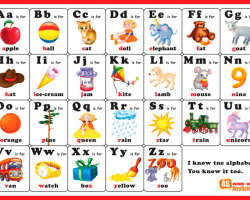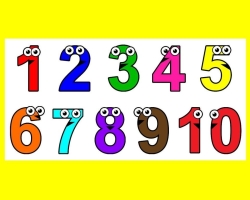In the past few years, more and more parents have been trying to teach their child foreign languages \u200b\u200bsince childhood. This allows children to develop comprehensively, expand their horizons and open new prospects.
Content
Read more about what age to start learning, as well as about the features of the choice of language, will be described in this article.
Why is it important to study foreign languages \u200b\u200bfor children?
The main advantages of the early teaching of a child are to foreign languages:
- memory development;
- improvement of concentration;
- development of flexible thinking;
- increasing intelligence;
- character formation;
- expanding opportunities in study and work.

When a child learns a foreign language, he is involved the left hemisphere. This allows you to lay the foundations of linguistic syntax, grammar and phonemic data. This will improve the memorization of the pronunciation of foreign languages, their meanings and subtleties of application. The child perceives the language better, and learning is more harmonious.
What foreign language to choose to your child?
Most parents prefer English, which opens up many opportunities. This language is considered universal and international. Regardless of where your child will go in the future, it will easily communicate with local residents.
However, parents should take into account not only the prevalence of the language, but also the tendency of their child:
- If you want the children to grow out of extraordinary, and both hemispheres develop, give preference japanese language. It is quite complicated. However, children will be able to remember the hieroglyphs, based on the images.
- For children who show a tendency to music, it is suitable chinese. Its peculiarity is that some of the same words can have different meanings. It all depends on the tones that are in the Chinese language. This will contribute to the stimulation of music centers. Linguists also believe that Chinese is the language of the future.
- French or Spanish Suitable for studying sociable children.
- For children who have well developed logic and practicality, it is suitable german. This will contribute to the fact that the child will do everything in order.
- If your child loves fantasize and dreamGive preference to English.
If you wish, you can choose several languages \u200b\u200bto teach a child. However, start from the abilities of your baby. Do not overload it. Be prepared for the fact that some knowledge may be unclaimed in the future.
When to learn a foreign language to a child?
Particular attention should be paid to age to the child when you can start learning a foreign language. More about this will be described later.

From the first days of life
- At a small age, you will not be able to send the child to school or to courses in a foreign language. It will also be quite difficult to find a tutor who agrees to conduct classes.
- Therefore, you will have to focus only on your knowledge. The best option is to sing lullabies in a foreign language.
The main advantages of classes at this age include:
- children easily perceive the information received;
- memory is aimed at obtaining new knowledge from parents;
- instilling intuitive language perception;
- parallel study of the native and foreign language.
Among the minuses, it should be noted:
- if parents do not speak perfectly, you can harm the child;
- psychological unpreparedness to study;
- negative influence on the study of the native language.
At the age of 1.5 to 2 years
- At this age, there is always a chance to give a child to learn languages \u200b\u200bto a special school. However, parents will be required to attend the classroom. The child’s desire to attend classes should also be taken into account.
- The main advantages of learning at this age include that the brain center of children is aimed at learning the language.
- The minus is that the emotional background to training will be violated, if the educational process is planned incorrectly.
At the age of 3 to 5 years
- Most teachers are convinced that it is necessary to start studying foreign languages \u200b\u200bat that age. In addition, it follows combine classes with the development of motor skills, perseverance and imagination. If necessary, conduct lessons in a playful way to lift the child.
- It should also be borne in mind that between a three -year and five -year -old child a tremendous difference.
However, they have a number of similar features, among which:
- preschool period;
- the child increasingly uses the pronoun "I";
- the development of self -esteem occurs, children are increasingly wanting to be like adults, so this can be used for motivation;
- love for role -playing games, which can be used in the learning process;
- the child begins to know the world, so he will be interested in teaching foreign languages;
- the need for motivation for study.

Among the main advantages of training at this age, they distinguish:
- ownership skills;
- the child perceives new information well;
- children in a playful way get acquainted with the world. Therefore, games can be used in the learning process;
- competition with other children begins.
Of the minuses of learning a foreign language at this age, they distinguish:
- do not use the playing form of learning, children will lose interest;
- the need to use motivation;
- a child may develop a negative attitude to foreign languages;
- at the age of three, children experience the age crisis, so strong load can negatively affect its psychological state.
At the age of 5 to 7 years
- At this age, children are increasingly replenishing their vocabulary with words from their native language. They activate communication with peers. Children are more and more ready to listen.
- Therefore, at the age of 5 and 7, it is more advisable to record a child on group classes. Considering that children already have certain ideas about the world, it will be easier for them to study new words. After all, they will visualize them. Children are increasingly concentrating on certain actions.
- Even if the lesson is uninteresting, the baby will be able to withstand about half an hour under the guidance of an adult. The lessons should be funny and interesting. However, they should not be turned into an exciting adventure. Otherwise, in the future, children will wait for disappointment. At this age, children are self -organized, and they increase the amount of memory.
Among the main shortcomings of training at this age, they distinguish:
- the baby is stressed, because he goes from kindergarten to school;
- they study foreign languages \u200b\u200bat the school, however, they take place in a standard form. This can bring down the mood of the child a little.
As you can see, you can learn foreign languages \u200b\u200bat any age. However, it is important to consider the child’s desire. If at a certain moment he does not have a desire to learn foreign languages, he should not force him. By this you can violate the psychological state of the child.

Methods of teaching children to a foreign language: reviews
- Zhanna, 33 years: As you know, today it is quite difficult to get a job in life, if you do not know a foreign language. Therefore, as soon as the son turned 3 years old, we gave him to kindergarten with a language bias. Literally after 2 years, the child already knows how to speak English, which will be significantly useful to him in the study of the school curriculum.
- Olga, 37 years old: Unfortunately, the school curriculum does not allow the child to fully learn a foreign language. Therefore, my husband and I decided to give my daughter to additional classes. Now for 2 years, since she has been studying German and English. I am convinced that this will come in handy to her in adulthood.
- Valentina, 50 years: Today, without knowledge of a foreign language, it is quite difficult. Therefore, my grandson was sent to courses on the study of Chinese and English, because they are considered the most popular. I hope that the grandson will not disappear the desire to engage, and the knowledge gained will be useful to him in life.
Useful articles about children and for children:
- Maternal burnout: symptoms, stages
- How to deal with children's whims
- Books for teenage girls
- Mental arithmetic for children
- Ecology riddles for preschoolers and schoolchildren








Create a successful business on marketplaces.